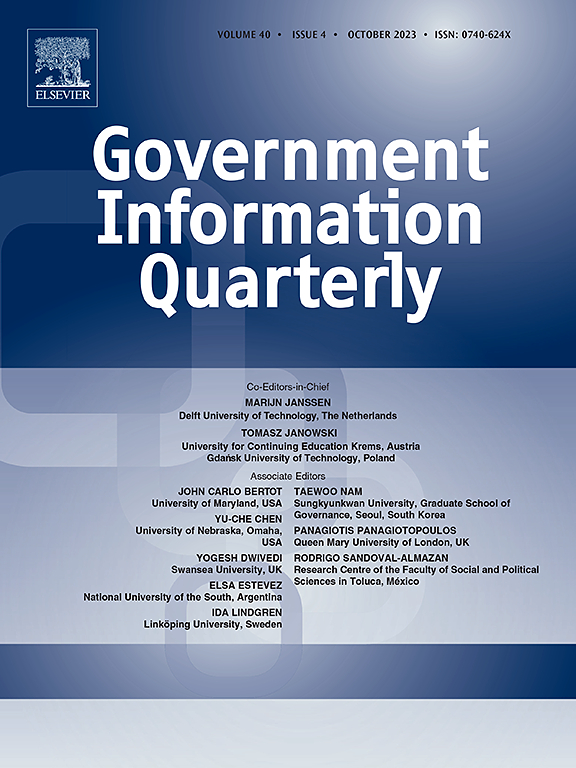Data-driven intelligence in crisis: The case of Ukrainian refugee management
IF 10
1区 管理学
Q1 INFORMATION SCIENCE & LIBRARY SCIENCE
引用次数: 0
Abstract
The ongoing conflict in Ukraine has triggered a humanitarian crisis, leading to a substantial increase in refugees. This situation presents a significant challenge for European countries, emphasizing the urgent need for effective refugee management strategies. Hence, effective decision-making is needed for the public sector to create a better livelihood for refugees. In this study, we propose using the concept of intelligence defined by Herbert Simon for effective refugee management. Following the Design Science Research Methodology, we utilize 58 semi-structured stakeholder interviews within Switzerland to identify problems and define design goals that facilitate intelligence in refugee management. Based on the design goals, we developed R2G – “Refugees to Government”, an application that utilizes community data and state-of-the-art NLP, including a chatbot interface, to offer an interactive dashboard for identifying refugee needs. The chatbot allows policymakers to interact with refugee data through dynamic, conversational queries, enabling real-time identification of refugee needs and providing data-driven intelligence. Our assessment of R2G, facilitated through 28 semi-structured interviews, resulted in four design principles for data-driven intelligence in refugee management: community-driven insight, spatial-temporal knowledge, multilingual data synthesis and visualization, and interactive data querying through chatbots. Additionally, we provide policy recommendations emphasizing the ethical use of community data, the integration of advanced NLP techniques in government processes, and the need for shifting governmental roles towards data analytics.
危机中的数据驱动情报:乌克兰难民管理案例
乌克兰持续不断的冲突引发了一场人道主义危机,导致难民人数大幅增加。这种情况对欧洲国家构成重大挑战,强调迫切需要制订有效的难民管理战略。因此,公共部门需要有效的决策,为难民创造更好的生计。在这项研究中,我们建议使用赫伯特·西蒙定义的情报概念进行有效的难民管理。遵循设计科学研究方法论,我们利用瑞士境内的58个半结构化利益相关者访谈来识别问题并定义设计目标,从而促进难民管理的智能化。基于设计目标,我们开发了R2G——“难民到政府”,这是一个利用社区数据和最先进的自然语言处理(NLP)的应用程序,包括聊天机器人界面,为识别难民需求提供了一个交互式仪表板。聊天机器人允许政策制定者通过动态对话查询与难民数据进行交互,从而实时识别难民需求并提供数据驱动的情报。通过28个半结构化访谈,我们对R2G进行了评估,得出了难民管理中数据驱动智能的四个设计原则:社区驱动的洞察力、时空知识、多语言数据合成和可视化,以及通过聊天机器人进行交互式数据查询。此外,我们还提供了政策建议,强调社区数据的道德使用,将先进的NLP技术整合到政府流程中,以及将政府角色转向数据分析的必要性。
本文章由计算机程序翻译,如有差异,请以英文原文为准。
求助全文
约1分钟内获得全文
求助全文
来源期刊

Government Information Quarterly
INFORMATION SCIENCE & LIBRARY SCIENCE-
CiteScore
15.70
自引率
16.70%
发文量
106
期刊介绍:
Government Information Quarterly (GIQ) delves into the convergence of policy, information technology, government, and the public. It explores the impact of policies on government information flows, the role of technology in innovative government services, and the dynamic between citizens and governing bodies in the digital age. GIQ serves as a premier journal, disseminating high-quality research and insights that bridge the realms of policy, information technology, government, and public engagement.
 求助内容:
求助内容: 应助结果提醒方式:
应助结果提醒方式:


